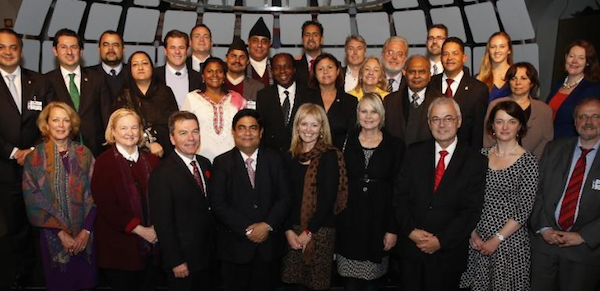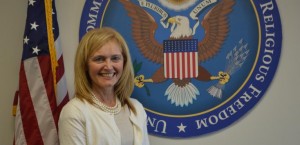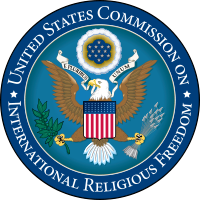
30 Parliamentarians Meet With USCIRF In Oslo To Sign A Freedom Of Religion Charter
- By WRN Editorial Staff --
- 13 Nov 2014 --

USCIRF Chair Katrina Lantos Swett, Commissioner Mary Ann Glendon, and Executive Director Jackie Wolcott with parliamentarians at the launch of the International Parliamentary Coalition to Advance Religious Freedom, November 8, 2014, Oslo.

“Despite great religious, political, and regional diversity, they were unified in agreeing to combat persecution and support the principles of religious freedom that are found in the Universal Declaration of Human Rights,” she said.
The Charter for Freedom of Religion or Belief, USCIRF said, commits the parliamentarians to promote religious freedom or belief for all persons through their work and respective institutions and enhance global cooperation.
The charter was signed by these parliamentarians at the Nobel Peace Center in Oslo last week.
Charter for Freedom of Religion or Belief (Download PDF Version)
Whereas severe violations of freedom of religion or belief continue to occur around the world, perpetrated by both governments and non-state actors;
Whereas studies indicate an increase in restrictions on the free practice of religion or belief, with the majority of the global population living in countries where their freedom to peacefully practice their faith could be restricted;
Whereas an increasing number of governments, international institutions, and non-governmental organizations are recognizing this emerging crisis and committing resources to ensure greater respect for this fundamental freedom;
Whereas the freedom of thought, conscience and religion is a universal, established, and non-derogable human right, enshrined in international treaties at the United Nations, binding conventions of regional bodies, and domestic constitutions;
The signatories REAFFIRM:
- Article 18 of the Universal Declaration of Human Rights, which declares “Everyone has the right to freedom of thought, conscience and religion; this right includes freedom to change his religion or belief, and freedom, either alone or in community with others and in public or private, to manifest his religion or belief in teaching, practice, worship and observance.”
- Freedom of thought, conscience and religion is an inalienable human right, encompassing the right to hold or not to hold any faith or belief, to change belief, and to be free from coercion to adopt a different belief.
- Freedom of religion or belief is a unique human right, in that to be fully enjoyed other incorporated rights must also be respected, such as the freedoms of expression, assembly, education, and movement.
The signatories COMMIT to:
- Promote freedom of religion or belief for all persons through their work and respective institutions.
- Enhance global cooperation by endeavoring to work across geographical, political, and religious lines.
- Undertake efforts to jointly promote freedom of religion or belief, share information, and mobilize effective responses.
Countries represented included Argentina, Brazil, Burma, Canada, Costa Rica, Dominican Republic, Germany, Italy, Malaysia, Nepal, Norway, Pakistan, South Africa, Sri Lanka, Turkey, United Kingdom, and Uruguay.
All world religions are addressed by the charter including Anglicanism, Bahá’í Faith, Baptist, Buddhism, Catholicism, Christianity, Eastern Orthodoxy, Evangelicalism, Hinduism, Islam, Jainism, Judaism, Lutheranism, Methodism, Mormonism, Oriental Orthodoxy, Presbyterianism, Scientology, Shinto, Sikhism, Taoism and others.
In addition, from the United States two Commissioners from the US Commission on International Religious Freedom participated, as well as the UN Special Rapporteur on Freedom of Religion or Belief.
The parliamentarians sent co-signed letters to the heads of state of Pakistan and Burma expressing concern about “religious freedom violations in each country”, and wrote Pope Francis to apprise him of the initiative.
“Some of us came to this meeting from environments of safety, but we were moved by the presence of others who attended at great personal risk,” said USCIRF Commissioner Mary Ann Glendon.
“We owe them our best effort to ensure that this new initiative gains strength and support, and we expect this network to grow,” Glendon said.
USCIRF Helps Launch International Parliamentary Coalition to Advance #ReligiousFreedom http://t.co/VlUZ50VLCK pic.twitter.com/qVulJ1f33d
— USCIRF (@USCIRF) November 12, 2014
About USCIRF
 USCIRF is an independent, bipartisan U.S. federal government commission, the first of its kind in the world, dedicated to defending the universal right to freedom of religion or belief abroad. USCIRF reviews the facts and circumstances of religious freedom violations and makes policy recommendations to the President,the Secretary of State, and Congress. USCIRF Commissioners are appointed by the President and the Congressional leadership of both political parties.
USCIRF is an independent, bipartisan U.S. federal government commission, the first of its kind in the world, dedicated to defending the universal right to freedom of religion or belief abroad. USCIRF reviews the facts and circumstances of religious freedom violations and makes policy recommendations to the President,the Secretary of State, and Congress. USCIRF Commissioners are appointed by the President and the Congressional leadership of both political parties.
U.S. Commission on International Religious Freedom
732 North Capitol Street, NW
Suite A714
Washington, DC 20401
Tel: 202-523-3240
Fax: 202-523-5020
media@uscirf.go




















